Reporter Marina Akhmedova interviewed DPR (Donetsk People’s Republic) Committee for POWs (Prisoners of War) official Lilia Rodionova. Marina Akhmedova presented a list of names — Ukrainian soldiers who went missing back in August 2014. “We don’t have them” was the answer given in the Cossack unit in Sverdlovsk, where their mothers thought they might have been. Responses from the Donetsk Ministry of State Security and other directorates of the DPR and the LPR (Lugansk People’s Republic) were identical. The mothers of the missing soldiers claim that their children have been taken to Russia by FSB operatives. Every day they are told that yet another inquiry has been fruitless, but they keep asking: “Why can’t we find our children?”
Lilia Rodionova reads the surnames on the list: “Remeniuk was killed in action. His mum already knows about it. They just have not come to terms with it, even though there is a DNA match. The parents still refuse to believe it.”
The interview:
Lilia Rodionova: For instance, I talk to one father every day — for fifteen years, his son worked in Moscow, then came home for a vacation, stayed a day, and literally the next morning the military commissars came and conscripted him. He had some kind of special ankle boots. The father was asked to identify the body by the boots, but he refused. He was told: “If you don’t want the one in the boots, just take that other one.”
I also had a case where they got a DNA match three times, but the mother refused to agree with the results. After all, a mother knows her son. If a grown man was missing a tooth, he is not going to grow it back. They were giving her a body with an extra tooth:
– I’m sorry… but a tooth won’t grow just like that… I won’t take him.
– What do you mean? He’s a DNA match. Take him.
– What do you mean? He’s a DNA match. Take him.
Marina Akhmedova: So, are you saying that these DNA test results were forged?
Lilia Rodionova: I don’t know. It’s hard for me to judge what goes on there. But I am often confronted with the fact that people refuse to believe that their children are dead, even if there is a DNA match. Swindlers have already cheated Remeniuk’s mother out of about 50,000 — 60,000 hryvna. They promised her to bring him back.
How did it start? It began with rumors that Russian soldiers took them prisoner. I had a list of 40 people. Remeniuk was on there, Karpov too, Oleg Chizh. The mothers claimed they were supposedly held in Lefortovo, (St. Petersburg, Russia). Wait a minute… (She recounts a dialogue with the mothers):
– What does your son do?
– A mechanic.
– Yours?
– A plumber.
– Yours?
– A teacher.
– A mechanic.
– Yours?
– A plumber.
– Yours?
– A teacher.
Who needs them in Lefortovo? They are common soldiers — would anyone be interested in them? No one! They aren’t there, of course.
There were isolated cases when the wounded Ukrainian soldiers from the Ilovaisk cauldron were taken to Russia. To take them here, to Donetsk, was 80 — 90 kilometers, and the roads were being shelled. It was closer to take them to Russia, to a hospital in Rostov. We also had cases when we would bring a POWs family here, and then take them to Russia, so that he wouldn’t be forced back into the fighting. Because he didn’t want to go back. But being kept in Russia against their will — that’s nonsense.
Then there were rumors that they were sold into slavery to Chechens. It’s as if all the so-called psychos conspired; they started telling the mothers that they could see their children working in harsh conditions in brick factories. Then other theories started appearing, that they are working in bootleg pits, in coal mines. What mines? Here, the mines all lie in disrepair. The miners themselves have nowhere to work. Rubbish!
So, now, there is yet another version from the psychos, that they are breaking polar ice somewhere in the Arctic Ocean, I have no idea what for. And another: that they are working at grape plantations in Crimea. And then there is the POW list kept by the notorious Ruban [Ukrainian colonel-general Vladimir Ruban is known for his work as an intermediary in POW exchanges — ed.] He lists the missing in action as POWs.
Marina Akhmedova: Why does he do that?
Lilia Rodionova: I don’t know.
Marina Akhmedova: Those missing in action — are they as good as dead?
Lilia Rodionova: In 90 percent of cases they are. There are still places where there are undiscovered burial sites. We are still continuing our search. Just yesterday we found human remains. In Lugansk, a medical examiner told me: he lives in Khryashevatoye, and just as all this fighting was happening there, UAF (Ukrainian Armed Forces) representatives came to him and asked for gasoline. He asked them why — they told him they needed to burn the bodies:
– Wait a minute! What are you thinking? You mustn’t burn them. If you do, you won’t be able to take DNA probes.
– But what about the corpse poison?
– But what about the corpse poison?
And so they told him these myths that people would get infected by poison seeping from the corpses and die. “Then bury them! You mustn’t burn them! In the earth they will be good for DNA analysis even seventy years from now. If you burn the bodies, all chance of identifying them is lost.”
Lilia Rodionova: It’s hard for the people on the other side, away from the war, to understand that, when the ammunition load explodes, there’s nothing left of the tank. The metal gets red-hot and melts, flowing like tar. What body is there to talk about? Everything is sintered to a piece this big (Lilia shows her fist), there’s no DNA in that. We can identify the crew only by the unit number on the tank. There is no other way. I had this one woman come to me, and she kept demanding and demanding that we give her back her son: “Where he is? He is not among the captured; he is not among the dead.” And where is he? Where, indeed?
In the Starobeshevo area there were body fragments hanging from power lines and trees. Bodies were torn to pieces. Yesterday we were in Uglegorsk. We dug up fragments. Guys from the Ukrainian side took them, but they could not go back because of the shelling. So they spent the night here, and this morning we finally sent them back. No doubt they were shocked by the shelling yesterday… Also, foxes and dogs drag pieces of bodies all over the ravines. We also have to deal with the Ukrainian side only taking what they want and throwing away the rest.
Marina Akhmedova: What don’t they want to take remains?
Lilia Rodionova: In Novogrigorievka, bodies were collected and then placed in trenches and covered up with dirt. A representative of the [Ukrainian] officer corps came; her call sign is Changar. She took only the identifiable remains, but the burnt fragments of bodies, arms, legs — they just left them there. Who needs a burned body? Who could identify it?
Marina Akhmedova: So why is it that you took them?
Lilia Rodionova: To send them to Ukraine.
Marina Akhmedova: So you take rotten body fragments, load them up in a car and send them back?
Lilia Rodionova: That’s right. In Chernukhino, when people started coming back to the smashed houses, they would find bits, simply bits of skull. We would gather what we could, put it in a plastic bag and send it.
Chizh, Oleg… I spent a lot of time in phone calls with his sister. This girl only had her brother, no one else. She was one of the first to start calling us: “Oleg Chizh! Oleg Chizh, he is missing!” So we started asking around, “Has anyone seen Oleg?” One of the POWs claimed to be him, but, once he was exchanged, it turned out to be a lie. When they asked him why he did this, he said: “I heard that everyone’s been looking for him, and so I thought that if I say that I’m him, I’d get home quicker.” This POW turned out to be a liar, and we all thought that Oleg was alive. We’ve looked for Oleg everywhere, even in Lefortovo and in Chechnya. And this despite the fact that we already had a hundred percent DNA match.
Marina Akhmedova: Taken from the remains?
Lilia Rodionova: Yes. He perished somewhere either on Saur-Mogila or in Stepanovka. They found his identity disks, as well as his personalized cross. But, on the other side, for a long time, they kept telling his sister that he is alive, that he is a prisoner here or there. I think that most likely this is how they try to conceal their losses. We also had this other prisoner, Nikolai Surmenko, from Kherson, I spent a lot of time communicating with his mum. He is a Chernobyl kid, ailing and week, with diabetes and about a meter and a half tall.
Marina Akhmedova: Why did he go fight, with problems like that?
Lilia Rodionova: Over there, no one cares — they don’t ask for their opinion. We’ve seen Ukrainian conscripts with missing fingers. Some even with a history of heart attack.
“Yes, Yaroslav,” Lilia answers her cell phone. “I’m busy right now, let’s do it in half an hour…” She explains: “This is a call from the other side, the ‘People’s Memory’ foundation. We collaborate with them on the POWs.”
…Back to Nikolai: his mother was worried sick that her son was here, but she was also afraid that if she got him back, he would be conscripted again. The whole village was laughing at her; they didn’t believe her son was fighting in the war. They said, “You’re probably hiding him from conscription somewhere.” But when he was released and returned home, they all chipped in and collected 5,000 hryvna to cover his medical expenses…
I had another case — a woman from some backwoods village in western Ukraine, who had never seen a cell phone, found Ruban’s list of POWs somewhere, and her son was number two-hundred and something on the list. She was using Ruban’s list to count off how many had been released, how much longer she would have to wait. Somebody gave her a cell phone, punched in my number, and she asked me:
– Please, could you let my son go home?
– Why should we release your son, specifically?
– His birthday is tomorrow. He is turning 19.
– We don’t have him, and never did.
– How could that be? He is on Ruban’s list.
– Why should we release your son, specifically?
– His birthday is tomorrow. He is turning 19.
– We don’t have him, and never did.
– How could that be? He is on Ruban’s list.
And she couldn’t understand that her son is not with us. Not anywhere, and not anymore. Do you understand? I always tell them: go talk to your local draft board, to the military commissars. They are the ones who came and took your son away. They are responsible for him. They should be the ones making enquiries. But you know how they treat mothers there, in Ukraine…
There was one officer from the Ilovaisk cauldron who called me every day: “How are my guys doing? What about this one? And that one?” He didn’t demand that we release them immediately, he simply asked about each and every one of them, and eventually I learned every one of their names along with him. He was the only officer who cared for his soldiers. The only one!
Marina Akhmedova: Do you still have POWs at the moment?
Lilia Rodionova: Yes. Not many, but we do have them. They’ll be exchanged soon. I visit them quite often. They have phones and they talk to their relatives. They’ve got a nursing station in there, and they get all the medical aid they need. But the wounded ones we try to hand over as soon as possible. We had a guy from Debaltsevo. He was in this truck with a small cargo bed, and they were taking out the wounded. It was cold back then, you know. Their truck was shelled on the Artyomovsk–Debaltsevo highway. Those still able to walk, they left the wounded behind. And one guy, they took his boots and his wristwatch — ”They won’t be of any use to you any more.”
You could still hear the wounded moaning for a few hours, but by the evening it grew quiet. He was sitting in the cab with a lieutenant. The lieutenant was twenty-two years old. Also wounded. The lieutenant told him: “Press against me, so we don’t freeze.” Then the lieutenant died, and he tried warming himself with the body until the body grew cold too. For three days he would crawl out of the cab to lick snow, but by the end he grew too weak to crawl back inside. When the militiamen came and picked him up, he thought they were angels from Heaven.
Marina Akhmedova: How did they realize he was alive?
Lilia Rodionova: He was moaning. They brought him in with severe frostbite. I forgot to tell you: he was a surgeon himself, a military medic. His blood pressure was almost imperceptible, and his entire body had frozen stiff. We contacted the other side right away: “Ready your best doctors!” We wanted to save both his hands, but he lost the right one.
Marina Akhmedova: Do you have information about the treatment of the captured Militiamen?
Lilia Rodionova: They are treated badly, but we don’t take revenge. We just want them, over there, to finally hear us and understand that we are human beings, and we treat them as human beings and want to be treated humanly as well. Those with brains will get the message.
Marina Akhmedova: You don’t take revenge because you’re against violence, or just because you want to get your message across?
Lilia Rodionova: So as not to avoid violence altogether! They need to understand us — nobody should act like they do! Even beasts don’t act like that!
It’s true that some civilians take up arms after being imprisoned. We had one mafia boss here, he lorded over a huge penal colony before the war. He is from Debaltsevo. One day, after a shelling, he stepped out into the street to check whether his house was still standing, and he was immediately arrested as a separatist suspect. They later tricked us into taking him in a POW exchange. Afterwards, he immediately volunteered for the Militia, notwithstanding that they had a rule in the joint — criminals don’t fight for the Reds or the Whites, organized crime is beyond politics.
Even though that’s no longer true — these days even prisons have become politicized. When our comrades are accused of separatism and sent to penal colonies, the other inmates do horrific things to them.
Marina Akhmedova: Why do they care about their political affiliation?
Lilia Rodionova: Well, I guess they are inmates from the other side. I don’t really know why they care about politics, but that’s the way it is. Let me tell you about a different story. Several civilians were captured near Snezhnoye. At first, they were kept at the Kramatorsk airfield in the pits with corpses, and later one of these boys was sent to a penal colony in Poltava and housed with criminals. That’s their method of re-education — throwing people in with hardened criminals. This kid was severely beaten, and when the second prisoner, Alexei Zhukov, was thrown in there, the first one already had all of his teeth knocked out. Even worse, he has diabetes. So his blood sugar spiked, and he started having seizures, he was falling into a coma. At that point the local mafia boss found out about these two who were convicted of separatism, and the abuse instantly stopped. The inmates would even chew the food for him. So there are lots of different circumstances.
I, myself, was a prisoner on the other side, too. In July 2014. I started going to Slavyansk, to evacuate the wounded and the sick civilians who suffered from heart attacks and strokes. I took everybody I could fit in the ambulance. Then I started going to Snezhoye. That time I was going to Marinovka to pick up a wounded Ukrainian soldier and to bring him here, to Donetsk.
Marina Akhmedova: Why did you decide to risk your life for a wounded Ukrainian soldier?
Lilia Rodionova: What does it matter to me? We spent the entire day transporting the wounded, and in the end, he was the last one left. He needed to be transported to a hospital. It was already dark, and we drove into an Ukrainian checkpoint. I don’t know why it was setup on that road. They riddled the ambulance with bullets. I have no idea how we survived. We hid in such small spaces… I don’t even know how we were able to fit in there.
Marina Akhmedova: Who was manning the checkpoint?
Lilia Rodionova: Border guards, I assume.
Marina Akhmedova: But the Ukrainian border guards supposedly don’t beat or abuse prisoners?
Lilia Rodionova: They didn’t beat us. In fact, they were unsure of what to do. They even pondered letting us go. When I got out of the ambulance, dressed in medical garb, they asked, astounded:
– Medics?!
– Yes, medics. Whom did you expect to see come out of an ambulance?
– Yes, medics. Whom did you expect to see come out of an ambulance?
We had our flashers on so we could be seen from afar. They shot at us because they were scared; they thought that we were a saboteur group. Finally, after much hesitation, they decided to send us to prison. We were sent to Uspenka, from there to Solntsevo, in the Starobeshevo district. That’s where the physical abuse started. From there we were taken to the Kramatorsk airfield by helicopter.
Marina Akhmedova: What do you mean by physical abuse?
Lilia Rodionova: They beat us with rifle butts. I still have pains in my shoulder from that time. They would strip us naked, though I am not sure why. They forced us to crawl from the helicopter to the shooting wall, staged simulated executions.
Marina Akhmedova: Did you crawl?
Lilia Rodionova: I did not crawl, but the rest had to crawl with sacks on their head. We all were beaten with rifle butts.
Marina Akhmedova: What did you feel when you were stripped naked? Shame?
Lilia Rodionova: Nothing. I had a bag over my head. I felt utterly devastated, empty. I’ve been asked since: “Did you pray?” Yes, I prayed: “Lord help me.” That was all I could think of. They liked doing it for some reason. It was hard for me to strip, of course. But then I thought to myself: “If you like it, if you want it, I don’t care, enjoy yourselves.” Later they allowed me to get dressed. But the bag on my head stayed on.
Marina Akhmedova: So, you didn’t see them?
Lilia Rodionova: No. I didn’t. I only saw the sneakers of one of them, in Solntsevo, and that’s it. Only heard their voices. Later, they took us to Izyum. There were police officers there, and just like the border guards, they were astonished: “You are medics, why did they even take you?” They brought us water, then some bread and tea, and locked us up in a jail cell. From there we were sent to the SBU (Ukrainian State Security) bureau in Kharkov. We waited in the car for a long time, and a conversation with the guards started — even though that was forbidden. But one of them said:
– I was born in Russia. I was there, on the Maidan, with the Berkut.
– You were in the Berkut? What are you doing here then?
– I kept my oath of service.
– To whom did you swear your oath?
– To the people.
– Well, I’m “the people,” and I’m sitting right here, in front of you, in handcuffs, with a bag on my head.
– But you’re a separatist.
– You know why I’m a separatist? Because when people gathered on Maidan, I worked during the day, every day. And in the evening, I ran home from work and switched on the TV to find out what was happening. And then, when they started beating you guys with chains, when they threw Molotov cocktails at you, I went to the rallies and I shouted: “Glory to the Berkut! The police are the real heroes!” We didn’t know how else to help you. We just came to the rallies and shouted so that you would know that we are with you, that you have our support. Now that you know this, live with it if you can!
– You were in the Berkut? What are you doing here then?
– I kept my oath of service.
– To whom did you swear your oath?
– To the people.
– Well, I’m “the people,” and I’m sitting right here, in front of you, in handcuffs, with a bag on my head.
– But you’re a separatist.
– You know why I’m a separatist? Because when people gathered on Maidan, I worked during the day, every day. And in the evening, I ran home from work and switched on the TV to find out what was happening. And then, when they started beating you guys with chains, when they threw Molotov cocktails at you, I went to the rallies and I shouted: “Glory to the Berkut! The police are the real heroes!” We didn’t know how else to help you. We just came to the rallies and shouted so that you would know that we are with you, that you have our support. Now that you know this, live with it if you can!
And when they were taking us away, he took my arm and he stroked it, and then found my hand in handcuffs and shook it twice. That’s it.
Marina Akhmedova: Is that handshake a dear memory for you?
Lilia Rodionova: Let that be a dear memory for him! If he is still alive, let him dwell on that!
The Russian Ministry of Foreign Affairs even asked the Kharkov SBU directorate about us. They were told that we were not there. Because we were there illegally and without paperwork. They fabricated allegations that my fingerprints — even though they didn’t even take my fingerprints — were found on four grenade launchers. It was only later that we started hearing in conversations: “People are looking for them already.” That was pure joy — that somebody is looking for us. Then they stopped beating us so badly. Solntsevo is where my mum lives. It’s only about ten kilometers from the place we were being held to the house where I was born.
Back then, I also gifted an amulet to one Ukrainian officer. I don’t know if he survived the Starobeshevo fighting, it was simply brutal later on there.
Marina Akhmedova: Why did you give him the amulet?
Lilia Rodionova: Because if it were not for him, we would have been killed. There was some other battalion stationed around there. They all talked in Ukrainian. And when that officer went to lunch, they came up to us and started talking in a west Ukrainian dialect. The started kicking us:
– You, fascist, you came to my land.
– My mother lives here! How far away is your house?
– My mother lives here! How far away is your house?
The officer came back, saw what was going on, yelled everybody away and posted his own guards to protect us. He stopped anyone from coming up to talk to us. Had it not been for him, God only knows what would have happened. I could have easily ended up raped or crippled, and it seemed like that was about to happen. They were vicious. This was the 23rd or 24th of July, and from the 21st through to the 22nd they had lots of friendly fire.
This is how it happened — they had a large unit in Kashty. This village is so small that it’s not even marked on the map, but many of the parents call me now to talk about it because that’s where their children went missing. See –(Lilia draws a diagram on a piece of paper) there are a few residential buildings here, then there is a river, and then that village. For some reason, they started shelling that unit from there, and these guys started shooting back. It escalated so much, that the whole place was burnt to cinders. I know this because we were thrown into a shell crater, and I touched the ground around. That’s where the strawberries used to grow — I’m local, I know. Now — only cinder!
Marina Akhmedova: Why did they shoot at their own?
Lilia Rodionova: Well, this happens quite a lot with them, actually. Back then, it was mostly accidental, because everybody was scared. Somebody would fire, and the mayhem would begin. At that same time, the 95th Brigade was hit by friendly fire near Kramatorsk. They would scare us, saying, “We will send you over to the 95th. They are furious now — they will do you in.” That is what they said to me, word for word. You asked me if I knew what they looked like. Yes, one of them I could recognize. He was tall, with a nose like this (Lilia shows a hooked line.)
Marina Akhmedova: You are drawing the image of a Mephistopholes.
Lilia Rodionova: He was very cruel. Very! He spoke in a pure west Ukrainian dialect. But when we were sitting in the car, someone came up, his voice sounded like he was a very young lad. He started shoving a piece of chocolate into my hand: “Eat… eat…” (in Ukrainian). He was whispering, afraid that someone would hear him. “Eat… eat…”
Marina Akhmedova: Did you think of yourself as a victim?
Lilia Rodionova: Yes.
Marina Akhmedova: Did you feel violated?
Lilia Rodionova: Yes — I felt completely powerless. I felt like a being without any rights, without anything.
Marina Akhmedova: Did you regret your work?
Lilia Rodionova: No. Of course not. I used to go to Seversk, evacuating the wounded from the local hospital. I got there and there was no electricity — we had to find the hospital in the dark. The nurse called us from that hospital and asked that we pick up the wounded. After we had already left, she called us again and said that half an hour after our departure, the Nazis [fighters of the Ukrainian National Guard — ed.] came to look for the wounded. When we were taking the wounded to Donetsk, they couldn’t believe that someone was able to come for them.
And two months later, the father of one of them called me and said:
– Remember the guy named so-and-so?
– Yes, I do.
– He was killed.
– Yes, I do.
– He was killed.
How can I regret anything? Although, yes, before all of this happened I had a good job, a cat and dogs.
Marina Akhmedova: Where are they now?
Lilia Rodionova: For a long time my house was in the occupied territory. On the August 7, at night — there was still no electricity — I visited home. I was there for seven minutes exactly. Met my mom. Patted the dogs, the cat too, and left. The dogs refused to eat after this. The cat followed suit. They all died. Now I don’t have any pets anymore… Before, our family always served dinner at seven, on a pretty tablecloth, with flowers on the table. I did not know then that I would be able to sleep in tents, eat whatever we can find, in any condition. Live without money. Live without makeup. Without all the things that seemed essential before.
Marina Akhmedova: In the past year, people here have seen unimaginable horrors. Atrocities that don’t have a place even in the most terrifying films. Why did it all happen?
Lilia Rodionova: We, the people of the Donbass, are no more important in the scheme of things than microbes, fleas! Who cares about us? There are other forces at work here, enormous forces. Everything happens when it has to happen. I think, after all is said and done, that the Soviet Union was something good. People here don’t want Novorussia; they don’t want the Russian Federation. They want to return to the Soviet Union.
Marina Akhmedova: So as to at least recapture the ideas of equality and fairness, if not actually implement them?
Lilia Rodionova: I am an obstetric nurse. I’ve been delivering babies since 1985. I remember that a lot of the bad things about the Soviet Union we only found out after the USSR’s breakup. I delivered lots and lots of babies. Time passed, and I was delivering the babies of those whom I once delivered.
Marina Akhmedova: And what do you feel now, when you pick up the pieces of those whom you, possibly, once brought into this world?
Lilia Rodionova: I’ve seen a lot of dead people. Even when I see strangers, it weighs on me heavily… We had a case recently. The mother of one Haritonuk called. Her son went missing. Three days later, I went to Logvinovo, there are these hills under the power lines. A smashed tank stands there. This young lad from the Militia showed me a gravesite. He buried a Ukrainian soldier there, in a shell crater. I looked at it, and there, on the sign, it said, “Haritonuk.” We talked:
– Oh… his mum was looking for him…
– How old was he?
– I don’t remember. How old are you?
– I am twenty-one. I buried him.
– How old was he?
– I don’t remember. How old are you?
– I am twenty-one. I buried him.
So, while battle was still raging, he buried him in the shell crater. He made a mound, found some sticks, tied them to make a cross, and even made a board with the name and put a helmet on top.
– He is your enemy. But you did this. Why?
– Nope, he is not an enemy to me anymore. Will you tell me sometime how old he was?
– I will.
– Nope, he is not an enemy to me anymore. Will you tell me sometime how old he was?
– I will.
His mum called again. He was nineteen years old, this tank operator.
Marina Akhmedova: So people don’t want to kill each other?
Lilia Rodionova: Of course not.
We brought prisoners for an exchange recently (Lilia starts a new story) and brought the bodies of the dead to give them back too. There are these narrow trenches at the Ukrainian checkpoint. I stepped out of the car. It was dark. I almost stepped on the head of one of the soldiers. They explained: “We weren’t told about the exchange.” I said, “hold on, I’ll get someone on the line.”
So I tried to make a phone call, but there was no service. Meanwhile, twenty of them already got out of the trenches, and were milling about around me — they were curious. One lad comes up to me:
– Tell me, is it true that you have wounded children over there?
– Of course. Wounded, some lost their little feet, little hands, little eyes.
– You are not lying? Is that true?
– Yes, it’s the truth.
– Of course. Wounded, some lost their little feet, little hands, little eyes.
– You are not lying? Is that true?
– Yes, it’s the truth.
Then a car comes with our guys. I brought four of theirs, and they had eight of ours. So they said: “No, then we will only give four back.” You know, when I was lined up against a wall in front of a firing squad, my hands weren’t shaking as much as they were then. It’s good that it was dark and they couldn’t see it. I couldn’t accept this… They were right there in front of me, standing with hands tied behind their backs, with bags on their heads. If I could only take four, what about the rest? I started bluffing as much as I could.
Marina Akhmedova: How?
Lilia Rodionova: I joked with one, hugged another. I said, “I promised you three, and brought you the fourth one as a sign of good faith. And you give me something in return!” So when they gave us all of them back, I wanted to leave as soon as possible, before they changed their minds. I took the body bags myself, and was moving them to the other car. Then I went to give back a flashlight I had borrowed from them, and I heard the same kid, who spoke to me earlier, whisper in the darkness:
– Tell me, what do I do now?
– Run! Run, while you are still alive. Run, run away from here!
– Run! Run, while you are still alive. Run, run away from here!
This kid — him I will remember, this is a memory dear to me… What will happen to the people from our side and theirs after the war? They are like dogs that have tasted blood. Such dogs are very hard to deal with later. With people it is even harder. Especially with women. Once a woman takes up arms and starts to kill, she becomes very cruel and dangerous. War becomes an addiction for her. I’ve seen women like this.
People ask me, “What if you had a gun back then?” I don’t know what I would have done, but I feel like I wouldn’t have been able to kill. I just wouldn’t be able to do it. They also tell me: “You have to hate them.” Wait a minute… Why do I have to hate someone? I always try to understand a person and understand why they do what they do. People always make choices for a reason. Maybe they don’t understand something, and maybe I don’t understand something… But I don’t feel hatred.
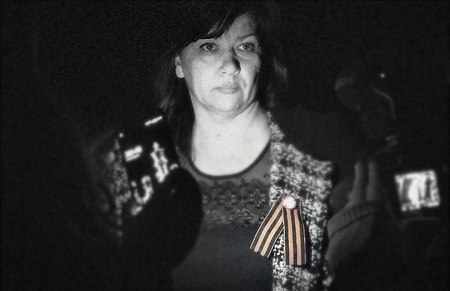
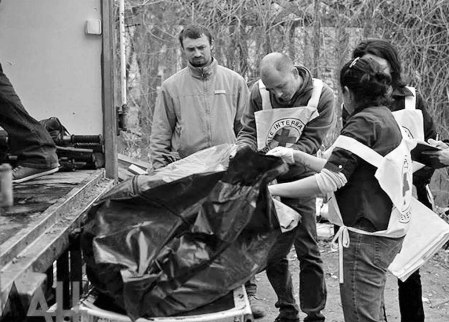
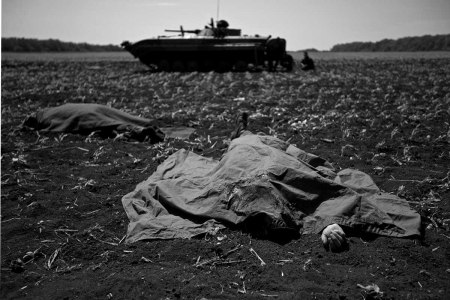
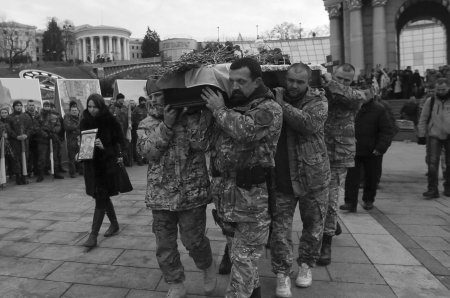
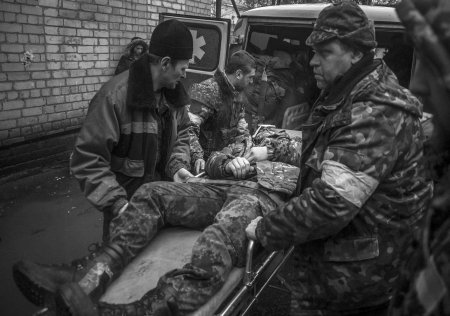
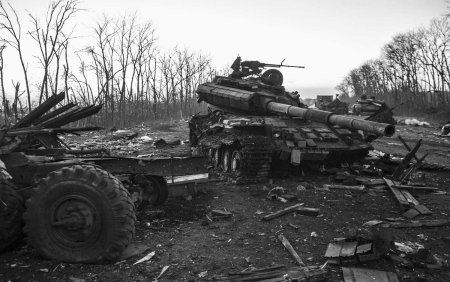
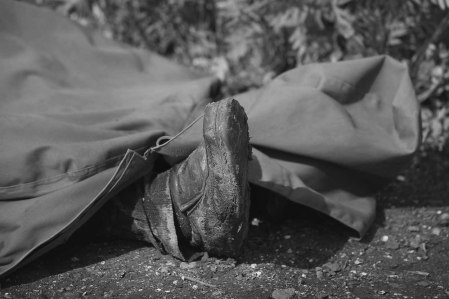
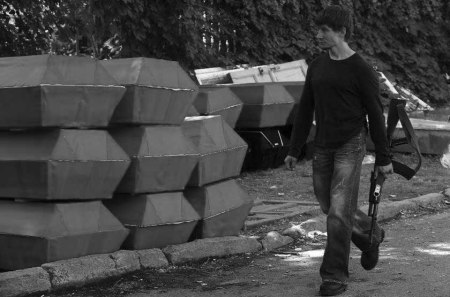
Keine Kommentare:
Kommentar veröffentlichen